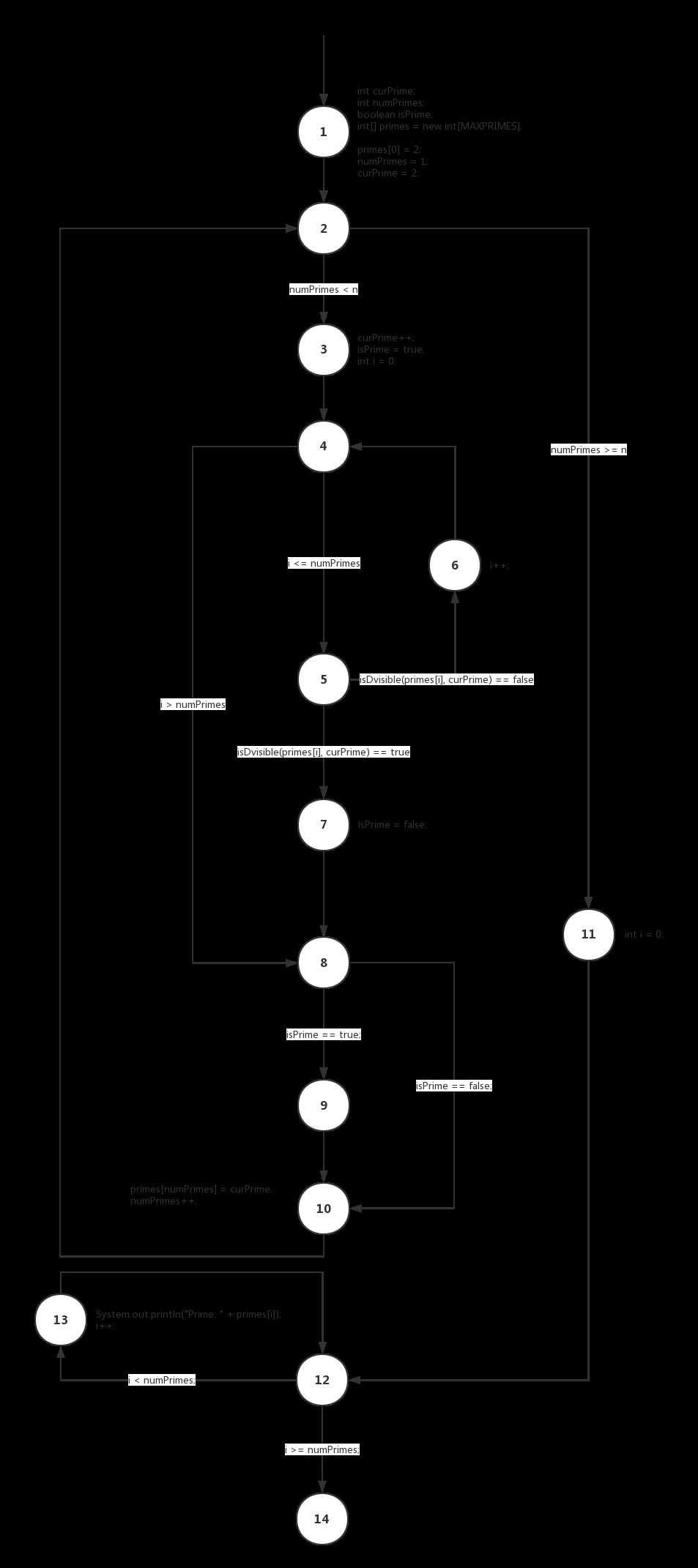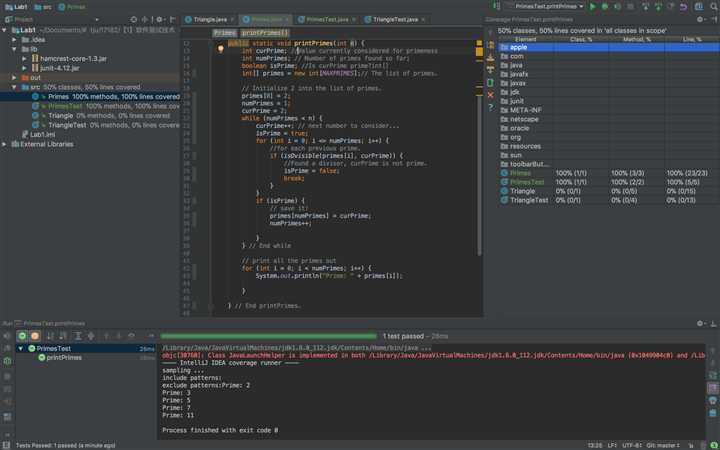homeworkEmail: [email protected]
studentId: 3015218104
studentName: 于春钰
Cnblogs: http://www.cnblogs.com/yuchunyu97/
GitHub: https://github.com/yuchunyu97/
Homework: 3
题目
Use the following method printPrimes() for question a-d.
/**
* Finds and prints n prime integers
* Jeff Offutt, Spring 2003
*/
private static void printPrimes(int n) {
int curPrime; //Value currently considered for primeness
int numPrimes; // Number of primes found so far;
boolean isPrime; //Is curPrime prime?
int[] primes = new int[MAXPRIMES];// The list of primes.
// Initialize 2 into the list of primes.
primes[0] = 2;
numPrimes = 1;
curPrime = 2;
while (numPrimes < n) {
curPrime++; // next number to consider...
isPrime = true;
for (int i = 0; i <= numPrimes; i++) {
//for each previous prime.
if (isDvisible(primes[i], curPrime)) {
//Found a divisor, curPrime is not prime.
isPrime = false;
break;
}
}
if (isPrime) {
// save it!
primes[numPrimes] = curPrime;
numPrimes++;
}
} // End while
// print all the primes out
for (int i = 0; i < numPrimes; i++) {
System.out.println("Prime: " + primes[i]);
}
} // End printPrimes.(a) Draw the control flow graph for the printPrime() method.
(b) Consider test cases ti = (n = 3) and t2 = ( n = 5). Although these tour the same prime paths in printPrime(), they don‘t necessarily find the same faults. Design a simple fault that t2 would be more likely to discover than t1 would.
(c) For printPrime(), find a test case such that the corresponding test path visits the edge that connects the beginning of the while statement to the for statement without going through the body of the while loop.
(d) Enumerate the test requirements for node coverage, edge coverage,and prime path coverage for the path for printPrimes().
(a)

(b)
令 MAXPRIMES = 4 ,t1 不能检查出错误,t2 发生数组越界,使得 t2 比 t1 更容易发现。
(c)
t3 = ( n = 1 )(d)
节点覆盖测试要求
TR = {
1, 2, 3, 4, 5, 6, 7, 8, 9, 10, 11, 12, 13, 14
}边覆盖测试要求
TR = {
(1, 2),
(2, 3),
(2, 11),
(3, 4),
(4, 5),
(4, 8),
(5, 6),
(5, 7),
(6, 4),
(7, 8),
(8, 9),
(8, 10),
(9, 10),
(10, 2),
(11, 12),
(12, 13),
(12, 14),
(13, 12)
}主路径覆盖测试要求
TR = {
(1, 2, 3, 4, 5, 6),
(1, 2, 3, 4, 5, 7, 8, 9, 10),
(1, 2, 3, 4, 5, 7, 8, 10),
(1, 2, 3, 4, 8, 9, 10),
(1, 2, 3, 4, 8, 10),
(1, 2, 11, 12, 13),
(1, 2, 11, 12, 14),
(2, 3, 4, 5, 7, 8, 9, 10, 2),
(2, 3, 4, 5, 7, 8, 10, 2),
(2, 3, 4, 8, 9, 10, 2),
(2, 3, 4, 8, 10, 2),
(3, 4, 5, 7, 8, 9, 10, 2, 3),
(3, 4, 5, 7, 8, 10, 2, 3),
(3, 4, 8, 9, 10, 2, 3),
(3, 4, 8, 10, 2, 3),
(3, 4, 5, 7, 8, 9, 10, 2, 11, 12, 13),
(3, 4, 5, 7, 8, 9, 10, 2, 11, 12, 14),
(3, 4, 5, 7, 8, 10, 2, 11, 12, 13),
(3, 4, 5, 7, 8, 10, 2, 11, 12, 14),
(3, 4, 8, 9, 10, 2, 11, 12, 13),
(3, 4, 8, 9, 10, 2, 11, 12, 14),
(3, 4, 8, 10, 2, 11, 12, 13),
(3, 4, 8, 10, 2, 11, 12, 14),
(4, 5, 6, 4),
(4, 5, 7, 8, 9, 10, 2, 3, 4),
(4, 5, 7, 8, 10, 2, 3, 4),
(4, 8, 9, 10, 2, 3, 4),
(4, 8, 10, 2, 3, 4),
(5, 6, 4, 5),
(5, 7, 8, 9, 10, 2, 3, 4, 5),
(5, 7, 8, 10, 2, 3, 4, 5),
(5, 6, 4, 8, 9, 10, 2, 3),
(5, 6, 4, 8, 10, 2, 3),
(5, 6, 4, 8, 9, 10, 2, 11, 12, 13),
(5, 6, 4, 8, 9, 10, 2, 11, 12, 14),
(5, 6, 4, 8, 10, 2, 11, 12, 13),
(5, 6, 4, 8, 10, 2, 11, 12, 14),
(6, 4, 5, 6),
(6, 4, 5, 7, 8, 9, 10, 2, 3),
(6, 4, 5, 7, 8, 10, 2, 3),
(6, 4, 5, 7, 8, 9, 10, 2, 11, 12, 13),
(6, 4, 5, 7, 8, 9, 10, 2, 11, 12, 13),
(6, 4, 5, 7, 8, 10, 2, 11, 12, 13),
(6, 4, 5, 7, 8, 10, 2, 11, 12, 13),
(7, 8, 9, 10, 2, 3, 4, 5, 7),
(7, 8, 9, 10, 2, 3, 4, 5, 6),
(7, 8, 10, 2, 3, 4, 5, 7),
(7, 8, 10, 2, 3, 4, 5, 6),
(8, 9, 10, 2, 3, 4, 5, 7, 8),
(8, 9, 10, 2, 3, 4, 8),
(8, 10, 2, 3, 4, 5, 7, 8),
(8, 10, 2, 3, 4, 8),
(9, 10, 2, 3, 4, 5, 7, 8, 9),
(9, 10, 2, 3, 4, 8, 9),
(10, 2, 3, 4, 5, 7, 8, 9, 10),
(10, 2, 3, 4, 8, 9, 10),
(10, 2, 3, 4, 5, 7, 8, 10),
(10, 2, 3, 4, 8, 10),
(12, 13, 12),
(13, 12, 13),
(13, 12, 14)
}基于 Junit 及 Eclemma(jacoco)实现一个主路径覆盖的测试
代码:
Primes.java
/**
* Created by yuchunyu97 on 2018/3/25.
*/
public class Primes {
/**
* Finds and prints n prime integers
* Jeff Offutt, Spring 2003
*/
private static int MAXPRIMES = 100;
public static void printPrimes(int n) {
int curPrime; //Value currently considered for primeness
int numPrimes; // Number of primes found so far;
boolean isPrime; //Is curPrime prime?int[]
int[] primes = new int[MAXPRIMES];// The list of primes.
// Initialize 2 into the list of primes.
primes[0] = 2;
numPrimes = 1;
curPrime = 2;
while (numPrimes < n) {
curPrime++; // next number to consider...
isPrime = true;
for (int i = 0; i <= numPrimes; i++) {
//for each previous prime.
if (isDvisible(primes[i], curPrime)) {
//Found a divisor, curPrime is not prime.
isPrime = false;
break;
}
}
if (isPrime) {
// save it!
primes[numPrimes] = curPrime;
numPrimes++;
}
} // End while
// print all the primes out
for (int i = 0; i < numPrimes; i++) {
System.out.println("Prime: " + primes[i]);
}
} // End printPrimes.
private static boolean isDvisible(int prime, int curPrime) {
if (prime == 0) {
return false;
}
int judge = curPrime % prime;
return judge == 0;
}
}测试代码:
PrimesTest.java
import org.junit.Before;
import org.junit.Test;
import static org.junit.Assert.*;
/**
* Created by yuchunyu97 on 2018/3/25.
*/
public class PrimesTest {
private Primes primes;
@Before
public void setUp() throws Exception {
primes = new Primes();
}
@Test
public void printPrimes() throws Exception {
primes.printPrimes(5);
}
}测试覆盖结果:
